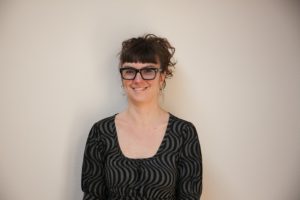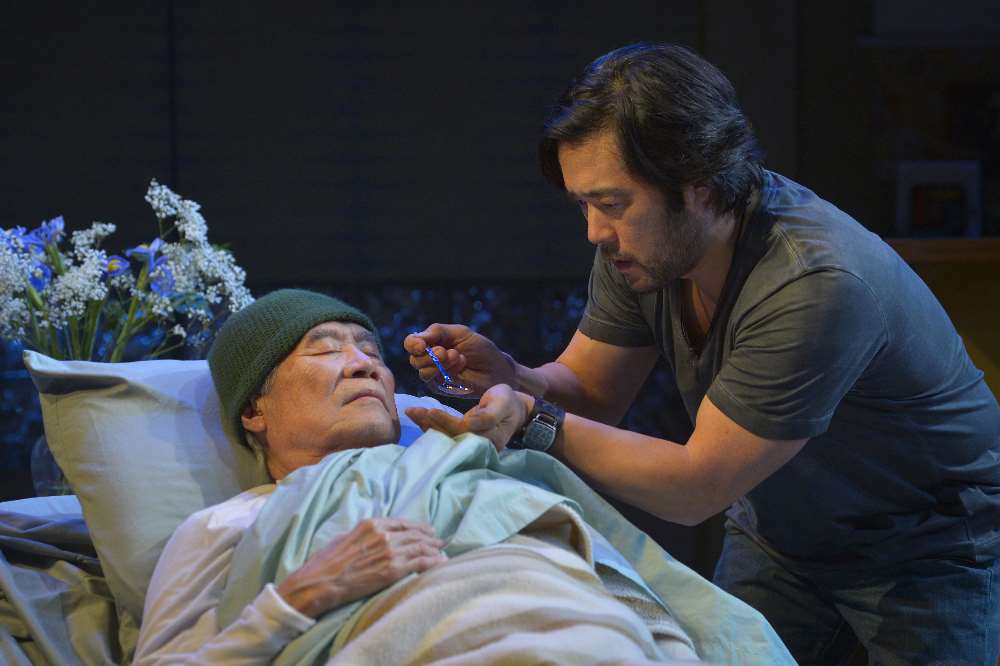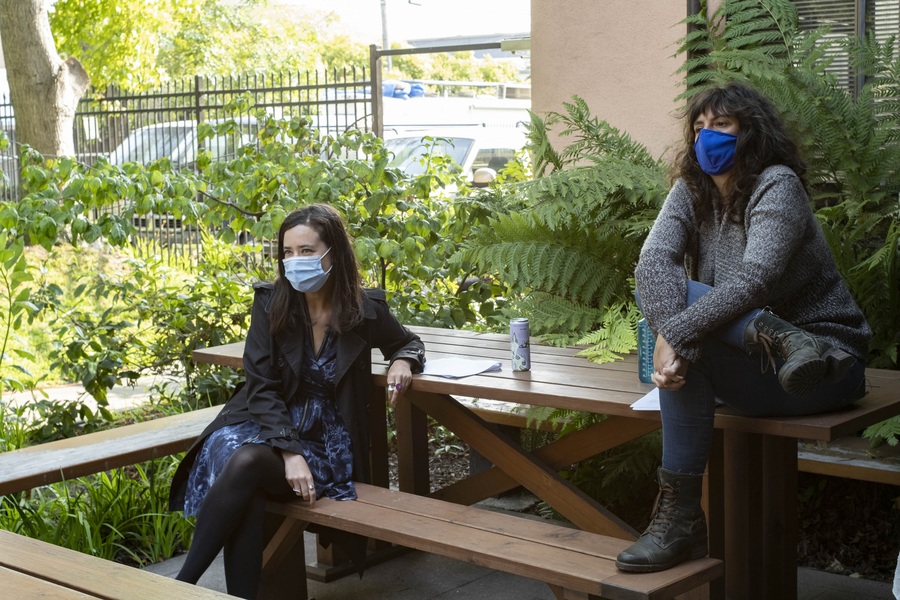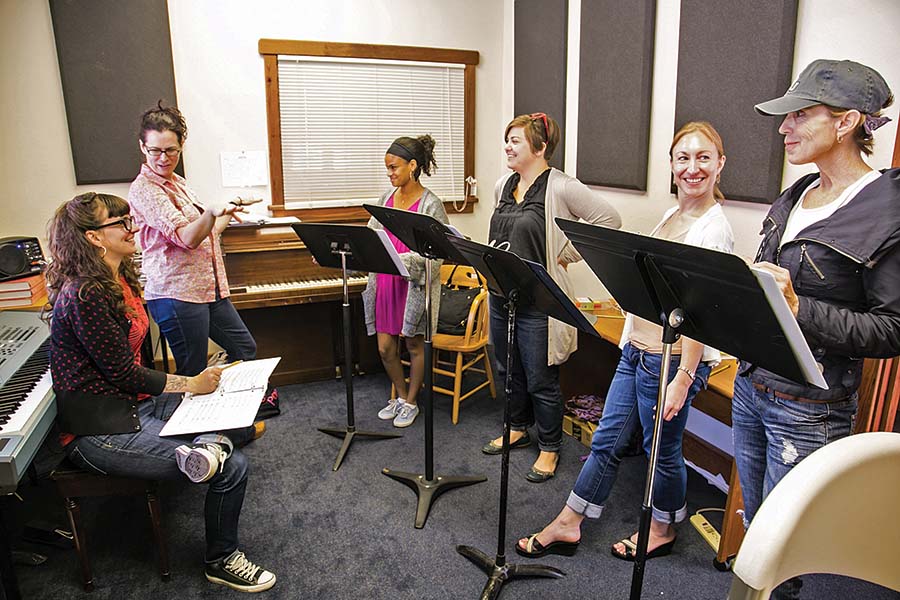Some of the most significant additions to the American theatre in the 21st century were developed at Berkeley Repertory Theatre. The likes of Lauren Yee, Julia Cho, and Anna Deavere Smith, among many others, have crafted some of their most critically consequential works with Berkeley as their starting line. Yet one significant name has been present at the birth of many of these new works—a name that might not be instantly recognizable to anyone outside the Bay Area’s theatre ecosystem.

Madeleine Oldham (she/her) is the director of Berkeley Repertory Theatre’s Center for the Creation and Development of New Work, known as the Ground Floor. Since its founding in 2012 by Oldham, former artistic director Tony Taccone, and former associate artistic director Les Waters, plays developed with the program have seen major premieres throughout the country, including Off-Broadway productions of Cho’s Aubergine, Yee’s Cambodian Rock Band, and Deavere Smith’s The Pipeline Project. Even Broadway’s Hadestown and its creator Anaȉs Mitchell’s development journey took them through the Ground Floor in 2015. That development proved crucial, as the show went on to garner 14 Tony nominations and win eight. Other playwrights who’ve taken projects to the East Bay Area to make Berkeley, Calif., their summer home include John Leguizamo, Jackie Sibblies Drury, Larissa FastHorse, and Berkeley native Itamar Moses.
Oldham is also the Rep’s resident dramaturg, a position that put her in the middle of the original run of Passing Strange in 2008 and Ruhl’s In the Next Room (or the Vibrator Play) in 2009—both plays that would eventually wend their way to Broadway.
Despite the intense demands on her time as she runs this year’s edition of the program—which closes Friday, Aug. 27, and features a collaboration among Ashley Smiley, Margo Hall, Sean San José, and Joan Osato as well as an untitled project from Taccone and Tony winner Ari’el Stachel—Oldham found a few moments to talk about the Ground Floor’s successes, the Rep’s transition from a classics theatre to one known for its commitment to new works, and the responsibility of a major regional theatre to its local artists and community.

DAVID JOHN CHÁVEZ: What is the biggest difference between where you were when Ground Floor started in 2012 and where you are now? Could you have imagined the program would reach the heights it has?
MADELEINE OLDHAM: It’s an interesting question. I still don’t imagine it, even though it’s happened. When we started, we looked around the field and researched places that do new-play development really well. We were known as a classics theatre back in the day, yet it became clear then that new work was at the heart of who we were becoming and where we were going. We didn’t have any systems in place to support the new work, and we needed those systems. We just asked a bunch of artists what their needs were, and what came back was that they were looking for time and space. We built a very bespoke program for Berkeley Rep and the community. That was sort of our aspiration, but it wasn’t clear to me whether it would work. I wasn’t sure it was sustainable.
Our application window is about to open for our 10th summer residency in 2022, which is a bit mind-boggling to me. Did I envision this when we started? No. What has surprised me is how much the program has grown and grown. We went from 200 applications in the first year to about 800 now, and we are still growing. The Ground Floor continues to fill a need.
When was the transition from Berkeley Rep’s identity as a classics theatre to one that is now known for commissioning and developing new works?
That shift was gradual, and it really started around 16 years ago. Back in 2005, we were involved in a season planning meeting, and I said to Tony, “Wouldn’t it be amazing if we could do a season of new plays?” He just shut me down and said, no, we love the classics. Not too long after, that perspective mellowed a lot and we have done multiple seasons of all new plays at this point. It was a gradual evolution, but it was also born from the essence of what this theatre company is. We’re a theatre who takes being in Berkeley to heart. Berkeley is a community that is very engaged in its culture, our political landscape, and who we are as Americans. The answer felt more visceral if we responded with new work to those kinds of questions, and it just felt like we had to make more space for it.
When you talk about moving toward more new works and then use the word classics to describe the American theatre canon—the connotation of that word seems to mean predominantly white male playwrights. That kind of production speaks mostly to historically white subscribers. Yet when you speak of new plays, we might associate that with viewpoints from a wider range of experiences: voices of women, LGBTQIA+, and Black, Indigenous, and people of color (BIPOC), to name a few. Was this a conscious effort on the part of Berkeley Rep, to be more inclusive in terms of who gets a chance to get readings at a major regional house, and ultimately, possibly making it onto your stages?
That was a huge part of the intention behind it. I think the same way about the canon, which is largely plays by white guys. That’s the culture we have operated in for a long time, but I believe it’s not the culture we operate in today. If we want to be in conversation with the culture we live in, we have to do something else. At Berkeley Rep, we have seven slots in a season, and that’s not very much. When you factor all the things a show in a season has to do—generating income, making sure our reputation is maintained, for example—there are all these considerations. We thought, a narrow viewing of works is restricting and doesn’t allow us to be as nimble as we want to be, and doesn’t address that imbalance of who gets to tell what story. That choice was super deliberate.
Without Ground Floor, Berkeley Rep wouldn’t have a way to support people that weren’t further along and more established in their careers. Ground Floor allows us to support people who have been working for a million years as well as people writing their first play. That’s been amazing, because that’s what seeding the field means, and it has challenged us to be way more inclusive.

A lot of what happened since the spring of 2020 has changed the way we produce and disseminate theatre, and part of the conversations that began then and continue today have to do with systems that have allowed white supremacy to flourish within many institutions. In terms of what you do, there seem to be two chapters of the Ground Floor novel: The first chapter being those initial eight years, and the second chapter beginning after spring of 2020. How do you think the program shifted based on those two huge dynamics?
Those kinds of ripples are still bubbling under the surface. We’ve had a pause and we’ve had a lot of time for reflection and soul-searching, and I think the American theatre has a lot to answer for. There are days when I feel optimistic and other days where I feel pessimistic. The fact that we can actually talk about the harm that predominantly white institutions have caused for many years is amazing.
I think it’s going to take time. People who have seen this have seen it for so long, and people who’ve never seen it, it’s brand new to them. It’s going to take time for us to find middle ground. I don’t really have a sense of what that’s going to look like, but I’m excited for the conversations and excited that Berkeley Rep has been really committed to anti-racism work in a way that we never have been before. I think it’s going to take time, a lot of time, but I do see things starting to move in a direction that feels really good.
What is something Berkeley Rep has done to challenge their own systems within the ecology of the Ground Floor?
Over time, one thing we continuously question is if we are supporting the artists in the best way possible. Are we giving artists what they need? We want an environment so that people can make the thing that is in their imagination the right way. Everybody says they are focused on process over product, which is such a cliché, but we wanted to make that really true and it was an aspiration of ours. We’ve created a space where we encourage people to have impractical ideas. Artists are encouraged to experiment and try things and actually fail. I think sometimes people come away from it going, “Oh my gosh, I’ve failed because I didn’t finish this play or that draft.” I think that’s all about how you look at it, because whatever that lesson is, you’re going to take that forward into the next thing you make. I just think there’s a bubbling ecology of the American theatre that happens.
How has the Ground Floor given Bay Area artists unique opportunities locally as well as connecting them with artists across the nation?
A piece that I find very satisfying is when we can introduce local artists to artists who are working nationally. In the before times, we would have communal dinners, and you might find yourself eating with different people every night. You might have someone in the Bay Area who maybe doesn’t know a lot of people outside the Bay, and they end up sitting next to someone who knows everyone that’s ever worked in the American theatre. That cross-pollination is very exciting. But also I just think it’s really important because it can be daunting to figure out how to break into the beyond. It’s very hard to make a living as an artist. I think a lot of people are trying to expand their horizons that way. I’m not saying we are the be-all, end-all of making connections, but it’s just a thing we can offer that’s hard for people to do on their own.
When it comes to Berkeley Rep’s role in the Bay Area, one of the criticisms a lot of regional theatres face is that seasons don’t always reflect the communities they are in. So many artists who are not from a region seem to get priority in these seasons, leaving local artists and local stories out. With something like the Ground Floor, do you feel it’s an important part of the program to prioritize local artists, or are you simply looking for the best work?
I will answer the last part of that question first. I think people saying that they just choose the best plays is what has kept the canon white and male for so long, so I definitely don’t say that. But yes, I absolutely take that into consideration and it is essential for me to support the local ecology. It’s a balance, because what does regional theatre even mean anymore? I think we’re having a little identity crisis about that. It’s sort of a tricky balance, to make sure that you are nurturing the people who live in your community as a regional theatre and making sure you’re positioning yourself ideally at the center of a national conversation in some way. The balance between those two things I think sometimes feels off to some people. I don’t think it’s a thing that we’ve solved, so I tend to play a long game on that. From one summer to the next, you might have one local project, and then you have five. Clearly, a theatre company reflecting the region is critical, or it should be, even though it doesn’t always feel like this is the case.
David John Chávez (he/him) is a Bay Area-based theatre critic and reporter. He is chair of the American Theatre Critics Association. Twitter: @davidjchavez


